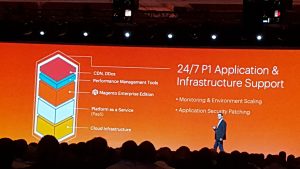Magento’s big announcement at Imagine 2016’s opening general session today is a game changer for clients. As of May 1, companies will have the option to move to Magento Enterprise Cloud.
Peter Sheldon, head of strategy at Magento, made this announcement to 2,500 of Magento’s nearest and dearest – the attendees of their annual conference. Sheldon mentioned that Magento wanted to remove the burden of testing and day-to-day infrastructure management to allow merchants to be able to create differentiated customer experience.
Over the course of time, Magento has evolved to make such a strategic move as this one:
- Step 1 – Community Edition
- Step 2 – Enterprise Edition
- Step 3 – Enterprise Cloud Edition
“This is a revolution, but also a natural extension for Magento,” Sheldon said.
The Stack at a Glance
Amazon Web Services (AWS) is the infrastructure provider of Enterprise Cloud Edition. Magento partnered with AWS to provide the ability to deploy stores close to customers (global availability zone) and ensure rapid  deployment and scalability. This partnership also ensures redundancy for each Magento merchant with triple redundant infrastructure.
deployment and scalability. This partnership also ensures redundancy for each Magento merchant with triple redundant infrastructure.
Platform as a Service (PAAS) allows the development teams to provide continuous integration, rapid deployment tools, and dev life-cycle management while rapidly scaling, cloning and tearing down dev environments. All of this is optimized for Magento with build scripts and configurations for optimal performance.
Magento Enterprise Edition – Magento Enterprise Edition sits on top of AWS and PAAS – and nothing will be locked down or different from the Enterprise Edition. Every merchant runs their own Magento Enterprise Edition and still has the ability to do integrations and customizations. “If you can do it in Enterprise Edition, you can do it in the cloud,” said Shelton.
Partnerships – Magento partnered with New Relic and Backfire.IO for performance management and for CDN/DDOS with Fastly. They have wrapped the package together with 24/7 P1 application and infrastructure support monitored by Magento.
“As everything moves to the cloud, many companies are looking to ease the burden of supporting infrastructure. With all of the benefits we saw today, we think that Magento developed a solid model,” commented Kausal Shah, Perficient practice director for commerce.
